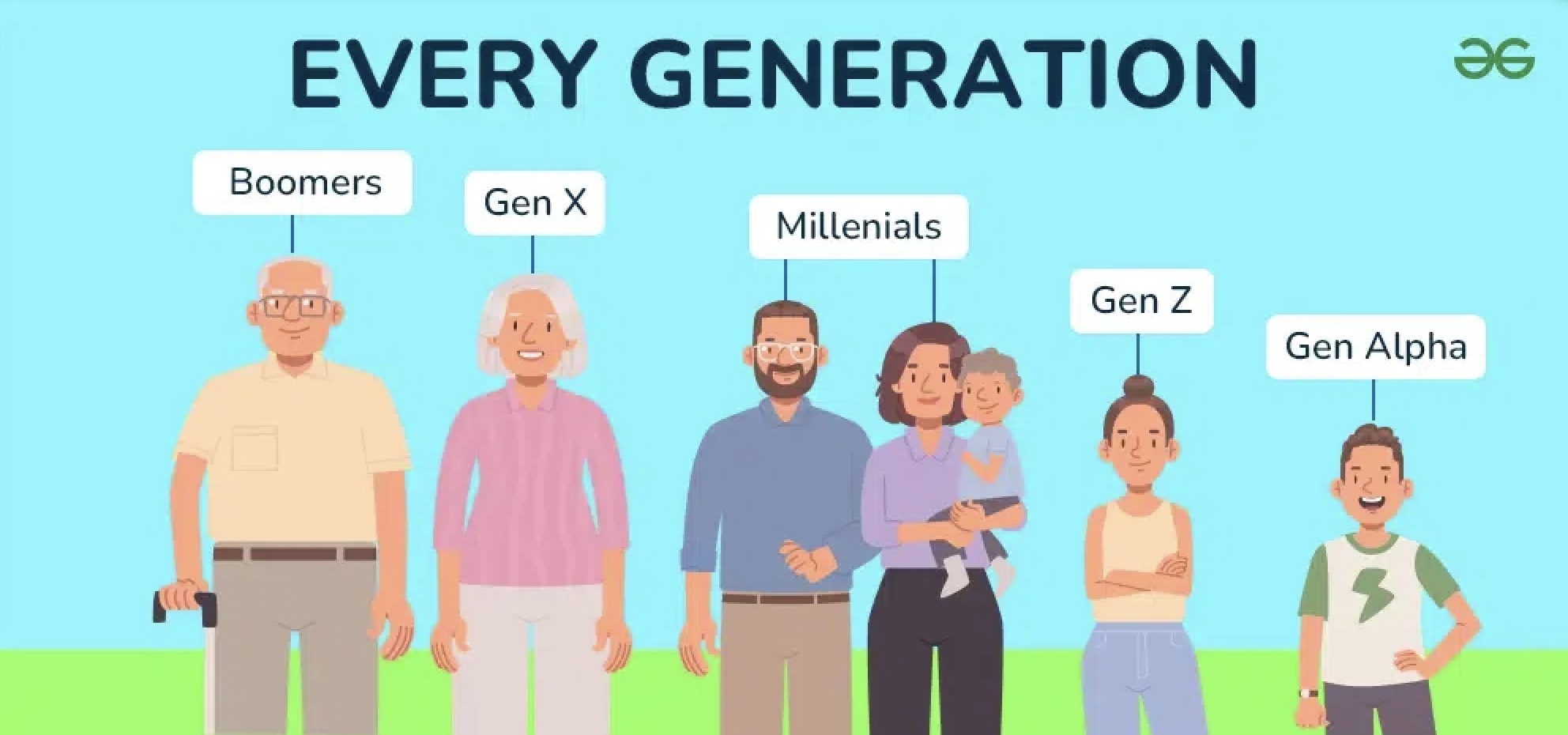Featured Image: Geeksforgeeks.org
When considering trends, collective consciousness, and cultural shifts over the years, generational labels provide an interesting lens.
You know the importance of generational distinctions, from the resilience of the Greatest Generation to the tech-savvy mindset of Generation Alpha, because they add the kind of behavioral, valuational, historical and milestone nuances that can make the study of any group of people truly rigorous.
Think of this as a toolkit for examining generations, whether you’re reflecting on your own family history or trying to better understand your child’s world.
GI Generation (Greatest Generation)
Birth Years: 1901–1927
Key Characteristics:
The Greatest Generation or GI Generation was born in one of the toughest times in modern history.
They survived the Great Depression, fought through World War II and spent decades rebuilding the world during postwar recovery. Their time was a time of resilience, duty and common purpose.
Major Historical Events:
The Great Depression (≈1929–≈1939)
World War II (1939–1945)
The power of industrialisation and urbanisation
Traits and Values:
It was fiercely proud of its unrelenting determination and work ethic
Sacrifice and patriotism, stressed community
Became practicalism of frugality and resourcefulness
Cultural Impact:
Their experiences crated the institutions we have — global economy, social policies. They were helping to guide the rebuilding of post-war societies that the Baby Boom generation would inherit.
The Silent Generation
Birth Years: 1928–1945
Key Characteristics:
Growing up through such times of economic hardship and conflict, including the Great Depression and World War II, shaped the Silent Generation. They came of age during the post-war boom, and embraced traditional family values. They were a bridge from their parents’ wartime privations to their children’s countercultural defiance.
Major Historical Events:
World War II and the lead up to it
The Civil Rights Movement (1950s and 1960s):
The early Cold War era
Traits and Values:
Conditioned not to question rules and authority
Valued diligence and stability more than self-expression
Noted for “loyal, faithful, and dependable”
Cultural Impact:
Recognized as “traditionalists,” they help shape the cultural mores of the mid-20th century — from the ideals of a nuclear family to post-war economic success.
Baby Boomers
Birth Years: 1946–1964
Key Characteristics:
The Baby Boomers were born during the Population Explosion after World War II. A wave of unprecedented prosperity and opportunity, an optimism and cultural upheaval never felt before in history. They entered the world as the counterculture took flight and discharged into adulthood just as they became motors of growth and innovation.
Major Historical Events:
Civil Rights Movement
Vietnam War and antiwar protests (1960s–1970s)
The Moon Landing (1969)
Traits and Values:
Emphasized individual experience and drive.
Legends of hard work and wealth-seeking, the industrious and economically minded.
Had an important role in countercultural and feminist movements.
Cultural Impact:
Baby Boomers shaped industries and culture, and they transformed politics as they searched for higher education, stable careers and suburban lifestyles. Their clout still looms over conversations about retirement and health care.
Generation X
Birth Years: 1965–1980
Key Characteristics:
Generation X grew up and came of age during a time of tremendous cultural and technological upheaval. Also nicknamed the “middle child” of Baby Boomers and Millennials, they are defined by their independence and adaptability. The first cohort to come of age amid divorce and dual-income families, they were seen as practical and wary.
Major Historical Events:
The close of the Cold War (1989)
The advent of personal computers and the internet
The AIDS epidemic (1980s — ’90s)
Traits and Values:
Independent and self-reliant
Prioritized work-life balance and flexibility
Often cynical toward authority and the establishment
Cultural Impact:
and the age of the internet drove the technology revolution, the growth of Silicon Valley and the age of the internet. Be it grunge music or indie films, everything they gave us from a cultural perspective changed the face of modern entertainment.
Millennials (Generation Y)
Birth Years: 1981–1996
Key Characteristics:
The internet explosion and social media revolution shaped millennials’ upbringing. Keen on inclusivity, creativity and work-life balance, they are frequently described as the most diverse and educated generation ever. They were shaped by recessions and student debt, compelling them to redefine traditional careers and life stages.
Major Historical Events:
September 11 attacks (2001)
The Great Recession (2008)
No, you’re the one getting the answer wrong The rise of social media platforms
Traits and Values:
Tech-savvy and innovative
Focus on what makes you rich — experiences
Foster diversity, equity, environmental responsibility
Cultural Impact:
Millennials have made their mark on just about everything, from workplace culture to digital marketing.
They also have transformed such societal priorities, with an emphasis on sustainability and mental health.
Generation Z
Birth Years: 1997–2012
Key Characteristics:
The first real “digital natives,” Generation Z have grown up in and around technology and social media.
They are socially aware, believe in authenticity, and are highly entrepreneurial.
These the core differentiators in a fast-moving world.
Major Historical Events:
The second point is the emergence of smart phones and apps.
COVID-19 pandemic (2020)
Global activism for climate change
Traits and Values:
Focusing on what really matters to you
Very entrepreneurial and very tech dependent.
Writedown: Advocates for social and environmental justice
Cultural Impact:
Generation Z is at the forefront of digital innovation, activism and the formation of new cultural norms. But their influence on social media and movements around the world is an industry- and attitude-changing force in every corner of the globe.
And here’s the rest, the formatting preserved for the WordPress block editor:
Generation Alpha
Birth Years: 2013–2025
Key Characteristics:
Generation Alpha, the youngest generation, is growing up in a tech-, A.I.- and social media-filled world. Unsurprisingly, the most educated generation of young people ever, they are poised to be the innovators but also to redefine traditional education and work frameworks.
Major Historical Events:
Connect the dots on climate change and action. There are only been two available last years, then do you think that we can contain climate change and global warming?
Post-pandemic societal shifts
These recent strides in AI and automation
Traits and Values:
Socially connected and digitalsavvy
It is heavily focused on education and creativity
Revolutionary may also break the systems socio and economic
Cultural Impact:
Generation Alpha is currently still young but will be the generation that will transform the experience of growing up in an ultra-connected world. Their experiences will likely inform technological and societal developments down the line.
What We Mean by Generational Names
For better or for worse, generational names and delimitation have no basis in science; they’re created by the assessments of social scientists, demographers and cultural commentators, who measure the zeitgeist against the specific experiences and historical events that have informed the cohorts of people born during relevant periods of time. These labels often spring from the need to describe people affected by the same converging cultural, economic and technology trends.
The Generational Nickname History:
Greatest Generation What journalist Tom Brokaw came up with in The Greatest Generation (1998), a book venerating men and women who survived the Great Depression and fought in World War II.
Silent Generation: The term was used to describe people living more muted, traditionalist lives as the economy recovered and conformity ruled the land in the 1940s and 1950s.
Baby Boomers: This generation earns its name based on the undeniable post-World War II baby boom, which sent birth rates soaring — during the years of 1946 to 1964.
Generation X: As defined by writer Douglas Coupland in his 1991 book Generation X: Tales for an Accelerated Culture, the term applied to those born after the Baby Boomers, who were self-sufficient and cynical.
Millennials: A term popularized by William Strauss and Neil Howe in their book, Generations: The History of America’s Future, 1584 to 2069. It reflects the generation growing up in the new millennium.”
Gen Z: This category is a logical continuation of the Millennials (Generation Y), as some sort of response to their online presence.
Gen Alpha: Mark McCrindle, a social researcher, coined the phrase ‘gen alpha’ to describe a new alphabet for new generations.
Generational Showdown: What Defines Generations?
Significant events: International, national or historical events such as wars, economic recessions, or technological developments usually define the start or end of a generation. For example you might remember the September 11 attacks (2001) as a defining moment for Millennials.
Generational identity is shaped by things like cultural changes: movements toward civil rights, offsets to women’s liberation, and so on.
Technology: Every generation is saddled with the technology of its youth. Baby Boomers had televisions, Generation X saw the development of personal computers, Millennials came of age around the internet, and Generation Z has never known a world without smartphones.
Generational Labels Matter:
Generational labels can be useful for tracking general trends, but it’s important to remember that they’re generalizations. The experience of people in a generation can be wildly different based on geography, wealth, culture, etc.
Critics of the Labels o generations
Generalization: You can’t generalize an entire generation, on the basis of what some stats tell you.
Cultural Bias: Much of the generational research has already been conducted in Western societies, which may not represent the wide gaps in experience in parts of the world.
The birth years of generations are arbitrary and vary, which …
Generational definitions remain an elastic method of identifying trends actors in society and how segments of humanity across the ages react during the landmark events of the human historical timeline.
Why It’s So Important For Parents to Focus on Generation
Understanding generational dynamics has never been more critical for parents of children being raised in a rapidly evolving world. Each generation of kids grows up under its own set of cultural and technological conditions — how they act, how they value things and what opportunities are available to them in the future all differ.”
Why This Works In Your Favor: Generational Awareness
Why Generations Matter: Recognizing generational attributes allows parents to adapt their parenting approach to the unique characteristics of their children. Generation Alpha, for example, is growing up in a world where everything is available on-demand and digitized, so parents may want to start with a focus on digital literacy and screen time management.
Building Generational Bridges: Each home has multiple generations, and more generations make life more meaningful for parents and children.
Colors To Future Generations: Mindful parents also have the opportunity to instil values and skills designed to set their children up for the future— resilience, empathy, adaptability, and beyond.
Parenting Across Generations:
Nostalgianamic Families: A lot of Millennials and Gen Z are already having kids, and their focus on inclusivity and mental health care is shining through in their parenting styles.
Generation X Parents: Gen X parents are famous for being independent, and so they usually encourage self-sufficiency and critical thinking in their children.
Baby Boomer grandparents: When baby boomers are parents, they tend to pass on family traditions and provide family support to younger generations.
Giving you insight into your child’s generation and outlining how it’s different from yours can help you navigate potential parenting pitfalls with empathy and foresight.
Generational Crossovers and Ambiguity
A generational group does not easily mold around everyone. Cuspers are able to relate to two generations, making their standpoint a blend of a little of the generation that came before and the one that comes after it.
Cusp Generations: A Blend of Traits:
Xennials (1977–1983): A micro-generation, Xennials were born between Generation X and Millennials, with analog childhoods and a digital adulthood.
Generation Z, a.k.a. Zillennials (1993–1998): A micro-generation acting as a gap between the two major Digital Natives, Zillennials both experienced the dawn of social media and can still conceive of life pre-smartphone.
Why Cusp Generations Matter:
They illustrate the overlapping, frequently tenuous nature of generational classifications and remind us that personal histories don’t easily conform to defined categories. This nuance matters to parents who want to know their children rather than retreat into generational stereotypes.
Conclusion
Generational names and labels may give clues about how generations navigate their unique time in history, and respond to the big ideologies that shape the world and live within it. These are not fixed labels but invented conditions that provide a helpful framework to understand broad changes over time.
Instead, parents can take context about how to raise their little ones in a world that’s vastly different from the one they grew up in, by holding insight into the unique qualities that make up their child’s generational makeup. Understanding generational dynamics is a potent tool for fostering connection and better equipping your child for the future, whether you’re figuring out digital navigational skills with Generation Alpha or teaching generation Z to be more resilient.




